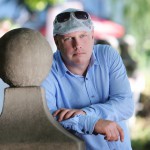Where you can make it to in literature
by Karel Škrabal
7. 5. 2015
I very much appreciate my invitation to the group whose influence is shaping CzechLit. As a poet whose poetry has never received an award or even a nomination for one I am all the more gratified. And ditto as a journalist who has never dealt with culture as a critic and an expert.
When I was in charge of the MF DNES Brno regional supplement, I tried to apply the same criteria of journalistic relevance to culture as I did to other fields of human activity. This resulted in animosity from those cultural circles whose space was thus confined, and words of praise from those who did not wish those circles well. Quite often it was the other way round the following week.
I began writing poetry in a notebook that I gave girls to read. I didn’t get into samizdat, because I didn’t know the pubs that the samizdat writers went to. And instead of Prague I went down to the Oslava with my haversack. Then came the Velvet Revolution and I started giving vent to my journalistic ambitions by hawking a student newspaper. When it actually published my topical poem on Ivan Blatný’s death, I was happy and thought I couldn’t get any further with literature. I only recently rediscovered that newspaper and the poem.
When they told us at the Lidové noviny Brno editorial office in the mid 1990s that they were going to fire us in six months’ time for organizational reasons (which was by no means such a routine affair as it is these days), a few of us colleagues remembered that we were still poets. In those days before we wrote poetry in Brno we fondled stones from Vysočina and sniffed Kunštát clay beneath a crucifix, so we didn’t even take our poems to a publisher and we set up Almanach Vítrholc, where we published them. A friend printed them out and we started to go around the pubs and clubs to read them out, which we still do to this day.
We published several almanachs and invited hordes of girls to our events. Our reputation in Brno got to such a level that two friends who had worked their way up from theatre cloakroom attendants to theatrical publishers offered to publish my collection. I called it Zapalte Prahu (Set Prague on Fire) and included my poem Mrdat sekretářky (Fuck Secretaries). Regional acclaim was guaranteed. A literary critic who had worked his way up to be mayor wrote that I did it well and I’m interesting. I thought I couldn’t get any further with literature. Nobody from Host, Petrov and the neighbouring cafes was talking to me yet.
These people only started talking to me after I started to meet up with them early in the morning at a particular Brno pub called Poslední leč. When they found out that under the right climatic conditions what they told me over a beer could have an effect on the local supplement of the most prestigious daily, I became a part of the cultural scene.
Since that time nine Vítrholc Almanachs have come out as well as five of my own collections. I am so well established on the literary scene that not a single review has come out on the last one in the eleven months since it was published. Only Ivan Wernisch has possibly managed anything like that so far.
As I have felt rather down on the literary scene for quite some time now and I feel all on my own, in February 2014 I set up and started to run a website called Nedělní chvilka poezie (Sunday Poetry Time), where every Sunday at 8 pm I publish texts by a particular poet. I do enjoy this work, I like it and five minutes before I die I’d like to received a medal for it for my contribution to the development of literature in our region. I very much look forward to working for CzechLit. As I am writing this column, I am saying to myself that I cannot get any further with this literature. And I would just like to add that I have never asked for a literary grant.
[ ]

Karel Škrabal, was the deputy editor-in-chief of the MF Dnes newspaper, focusing on regional newsrooms and currently works for Czech Television as the deputy editor-in-chief of regional news. He has published several collections of poetry, the latest being Radio Vítrholc (2014).